Brocton Surname Ancestry ResultsOur indexes 1000-1999 include entries for the spelling 'brocton'. In the period you have requested, we have the following 27 records (displaying 1 to 10): Single Surname Subscription | | | Buying all 27 results of this search individually would cost £124.00. But you can have free access to all 27 records for a year, to view, to save and print, for £100. Save £24.00. More... |
These sample scans are from the original record. You will get scans of the full pages or articles where the surname you searched for has been found. Your web browser may prevent the sample windows from opening; in this case please change your browser settings to allow pop-up windows from this site. Curia Regis Rolls
(1196-1201)
The Curia Regis, king's court, of mediaeval England took cases from throughout the country, and its records are among the most important surviving from this early period.BROCTON. Cost: £4.00.  | Sample scan, click to enlarge

| Pipe Roll
(1201-1202)
The Great Rolls of the Pipe are the central record of the crown compiling returns of income and expenditure from the sheriffs and farmers of the various English counties or shires. This is the oldest series of public records, and the earliest surviving instances of many surnames are found in the Pipe Rolls. Two sets of pipe rolls were prepared, not exact duplicates, the main series being the Treasurer's or Exchequer rolls, the copies (of which fewer have survived) being the Chancellor's rolls. The Chancellor's roll (or Antigraphum) for the 3rd year of king John became separated from that series at some date, and found its way to the miscellaneous records in the Chapter House at Westminster. As it happens, the Chancellor's roll for that year is in a better state of preservation than the Treasurer's roll, so it was chosen for publication by the Commissioners on the Public Records of the Kingdom, by whom it was printed in extenso in 1833. BROCTON. Cost: £4.00.  | Sample scan, click to enlarge
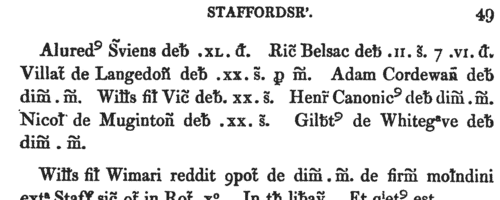
| Curia Regis Rolls
(1210-1212)
The Curia Regis, king's court, of mediaeval England took cases from throughout the country, and its records are among the most important surviving from this early period.BROCTON. Cost: £4.00.  | Sample scan, click to enlarge

| Patent Rolls: entries for Bedfordshire
(1276-1277)
Calendars of the patent rolls of the reign of king Edward I are printed in the Calendars of State Papers: but these cover only a fraction of the material on the rolls. From 1881 to 1889 the reports of the Deputy Keeper of the Public Record Office also include calendars of other material from the rolls - about five times as many entries as in the State Papers - predominantly mandates to the royal justices to hold sessions of oyer and terminer to resolve cases arising locally; but also other general business. The calendar for the 5th year of king Edward I [20 November 1276 to 19 November 1277], hitherto unindexed, is covered here.BROCTON. Cost: £6.00.  | Sample scan, click to enlarge
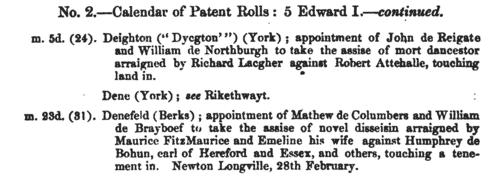
| Clerks and Clergy in Yorkshire, Nottinghamshire, and parts of Lancashire
(1266-1279)
The register of archbishop Walter Giffard of York, containing general diocesan business, mostly relating to clergy, was edited by William Brown for the Surtees Society and published in 1904. The ancient diocese of York covered all of Yorkshire and Nottinghamshire, as well as Lancashire north of the Ribble, southern Westmorland, and Hexhamshire in Northumberland. But there are few entries relating to the archdeaconry of Richmond, and few about the peculiar jurisdictions of Southwell, Ripon, Beverley and Hexham. The dioceses of Carlisle and Durham, both in the province of York, are hardly mentioned. Archbishop Giffard spent much of his pontificate away from his diocese, and the register has gaps: but at least it survives, unlike those for his immediate predecessors, Sewall de Boville (1256-1258) and Godfrey de Ludham (1258-1264). Moreover, there are ordination lists (pages 187 to 198) of acolytes, subdeacons, deacons and priests ordained in 1267 to 1274. These usually give full name, and indicate whether the man was 'religious' (a monk or friar), and whether his 'title' (sponsorship) arose from his own patrimony, but 'title' is not usually otherwise specified. BROCTON. Cost: £4.00.  | Sample scan, click to enlarge

| Worcestershire Inhabitants
(1280)
The Worcestershire Lay Subsidy roll of about 1280 lists lay inhabitants of each township of the shire and of each ward of the city of Worcester, with the amount of tax payable by each. Latin.BROCTON. Cost: £4.00.  | Sample scan, click to enlarge
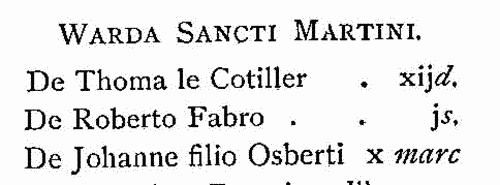
| Pontefract Cartulary
(1100-1300)
The Cluniac monastery of St John the Evangelist at Pontefract (Pomfret) in the West Riding of Yorkshire, was founded in the 11th century by Robert de Lascy. The grants of land made to the priory from then well into the 13th century were copied into a cartulary or chartulary which eventually came to Godfrey Wentworth of Woolley Park. This was edited by Richard Holmes and published by Yorkshire Archaeological Society in 1899 and 1902. The individuals named are mainly local landowners and tenants, canons, servants and wellwishers of the monastery. The charters before 1250 are often undated: the numbering of the charters is modern, and amounts to 561. The cartulary itself contains 11 fasciculi, to which Holmes gave these section names - I. The Seigniorial Charters; II. The Ecclesiastical Charters; III. Royal Charters and Confirmations; IV. The Local Charters (Pontefract &c.); V. The Ledstone Charters; VI. The Ledsham Charters; VII. Miscellaneous Charters; VIII. The Peckfield and other Charters; IX. and X. Scarborough and other Charters; and XI. Leases to Tenants. Ledston(e), Ledsham and Peckfield are all close to Pontefract, as is most of the property.BROCTON. Cost: £4.00.  | Sample scan, click to enlarge
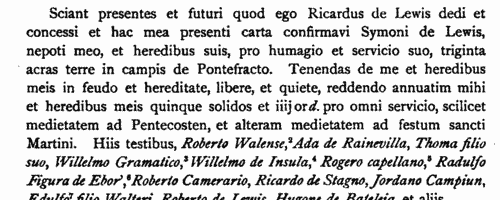
| Guisborough Cartulary
(1119-1300)
The Augustinian (black canons) priory of the Blessed Virgin Mary at Guisborough (Gyseburne) near Middlesbrough in north Yorkshire, was founded about 1119 by Robert de Brus. The 1100 or so grants of land (mostly in Cleveland) made to the priory from then well into the 13th century were copied into a cartulary or chartulary which survives as Cottonian Manuscript Cleopatra d ii (British Library). This was edited by W. Brown and published by the Surtees Society from 1889. This first part contains the charters from folios 1 to 233, items I to DXCIII. The texts have been stripped of repetitious legal formulae, retaining the details of the grantors, the property, and the witnesses: so the individuals named are mainly local landowners and tenants, canons, servants and wellwishers of the monastery. The charters before 1250 are often undated.BROCTON. Cost: £4.00.  | Sample scan, click to enlarge
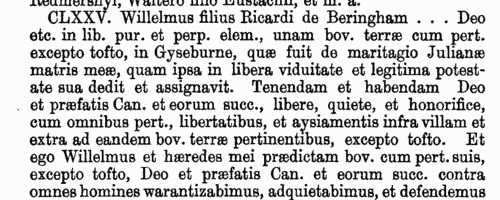
| Clerks and Clergy in Worcestershire and southwest Warwickshire.
(1268-1301)
The register of bishop Godfrey Giffard of Worcester, containing general diocesan business, mostly relating to clergy, but with some parochial affairs and disputes with names of parishioners. The diocese of Worcester at this period was almost exactly coextensive with the county of Worcester (minus its western finger), plus southwest Warwickshire (including Warwick itself). The register also includes ordination lists (as in the sample scan) of subdeacons, deacons and priests.BROCTON. Cost: £4.00.  | Sample scan, click to enlarge
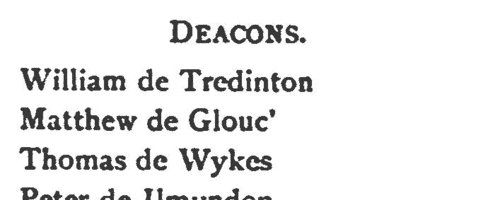
| Close Rolls
(1302-1307)
The close rolls of the 31st to 35th years of the reign of king Edward I, that is to the day of his death (7 July 1307), record the main artery of government administration in England, the orders sent out day by day to individual officers, especially sheriffs of shires: they are an exceptionally rich source for so early a period. In amongst this official material, the rolls were also used as a way of recording many acknowledgments of private debts and contracts between individuals. Most of the contents relate to England, but there are also entries concerning Wales, Scotland, Ireland and the English possessions in France.BROCTON. Cost: £4.00.  | Sample scan, click to enlarge

|
Research your ancestry, family history, genealogy and one-name study by direct access to original records and archives indexed by surname.
|












